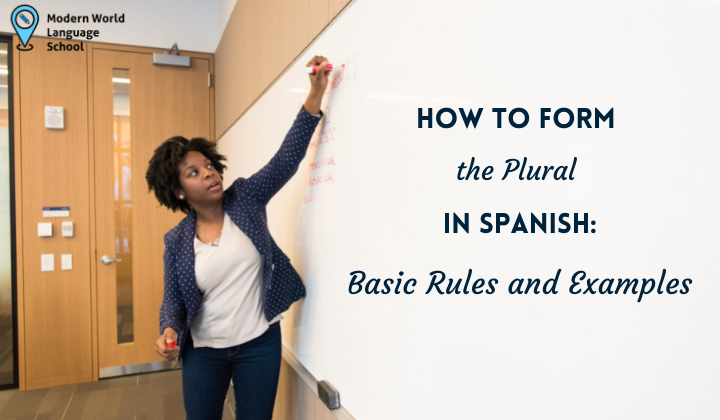
The plural of nouns in Spanish refers to a basic transformation of words from singular to plural when speaking of several objects, instead of just one, which is called a Grammatical Number (Número Gramatical).
Spanish nouns generally have a singular form (cuaderno) and a plural form (cuadernos), which is easy to determine by following a few simple rules:
The first rule of the plural in Spanish is to add the letter -S to the end of a word when it ends with a vowel without a TILDE ( AKA an Accent Mark) like the words “CASA” and “MESA”. Both “Casa” and “Mesa” do not have a TILDE in their singular form and end in the vowel A.
We also add the letter -S to the words that end in “É” like BABY, this being an exception to the rule. These are some examples of sentences that show how to form the plural of nouns in Spanish by adding -S.


The second rule says that we add the letters -ES when the word ends in a consonant. This rule applies to nouns such as “TELEVISOR” or “PAPEL” and also to those that end in a vowel with TILDE (á, í, ó, ú), but that is not É (as in “Bebé”). Here are some examples of sentences that use plural nouns in Spanish with the ending -ES:


When a word ends in the consonant -Z, we replace the -Z with -CES. Some common nouns in Spanish that end in -Z are: actriz, avestruz, feliz, pez y voz. Here are some examples of sentences with plural nouns in Spanish that end in -Z.

There are some words that do not need to change from singular to plural in Spanish. These words end in -S and -X. Basically, the ones that end in -S are originally already in the plural. Some words that do not have a plural form are: Tórax, Crisis, Paraguas, Saltamontes y Nada. Some of these words may have a singular form like “Saltamonte” (Grasshopper), but grammatically we should use them in the plural.

Hay dos _______ sobre la colina. (casa)
There are two _______ up in the hill.
Los _______ están comiendo en el patio. (perro)
The dogs are eating in the backyard.
En esa tienda hay muchas marcas de _______. (televisor)
In that store there are several tv brands.
Carlos escribió diez _______ para su nuevo álbum. (canción)
Carlos wrote ten songs for his new album.
Todos los _______ están durmiendo en su cuna. (bebé)
All the babies are sleeping in their cribs.
¿Me puedes ayudar a firmar estos ______ ? (papel)
Can you help me sing these papers?
La Academia ha premiado a varias _______ este año. (actriz)
The Academy has awarded several actresses this year.
Me encantan los _______ de tu acuario (pez)
I like the fish in your aquarium.
¡Cálmate! Los _______ no existen. (fantasma)
Relax! Ghosts do not exist.